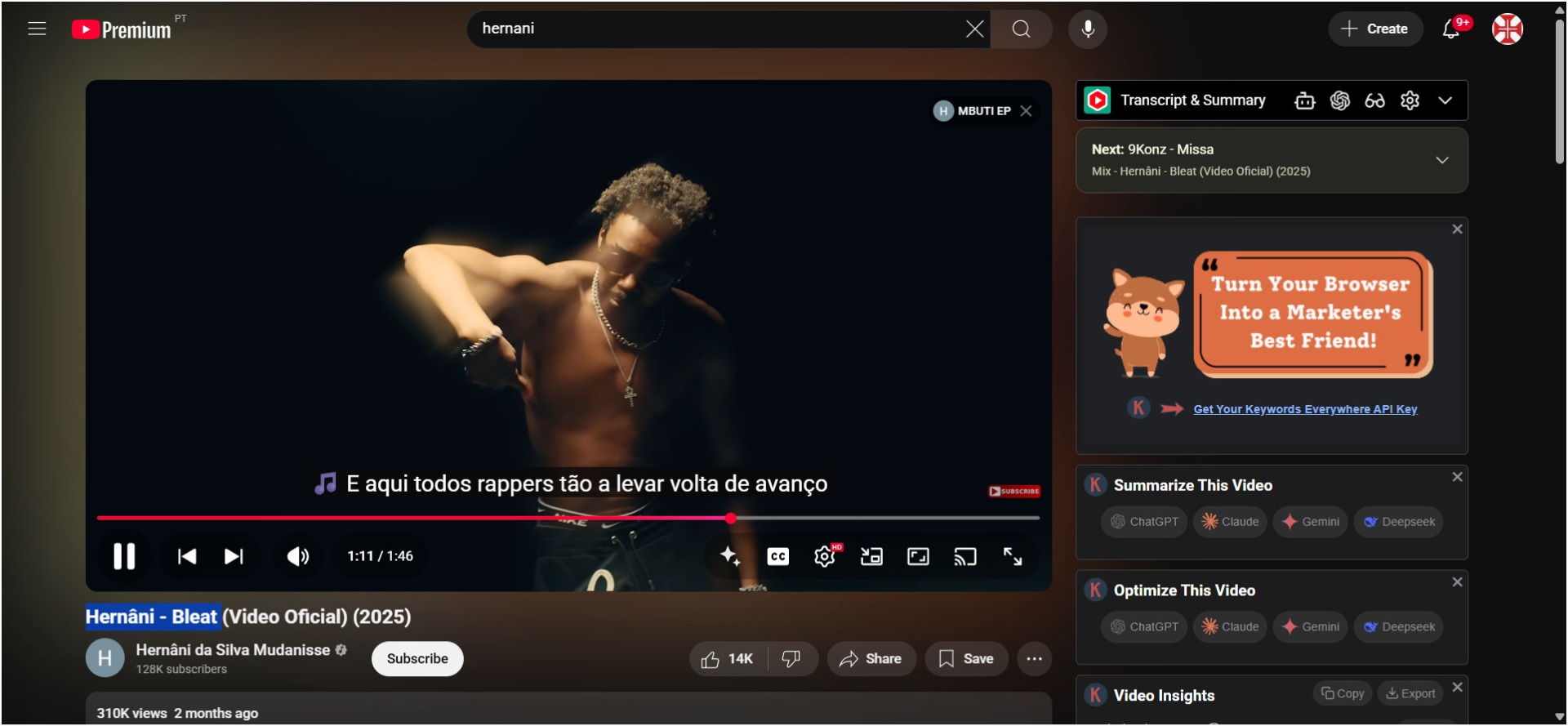mozambique music
Hernâni da Silva: Mozambique's Punchline King and Hip-Hop Pioneer
In the electrifying world of Mozambican hip-hop, Hernâni da Silva Mudanisse reigns as a lyrical powerhouse, blending razor-sharp punchlines with infectious rhythms that have defined a generation. Born on November 15, 1989, in Maputo, this rapper, songwriter, and producer—often hailed as one of the best in the country—has been dropping bars since he was just 14 years old. Brother to the iconic Dama do Bling, Hernâni's career is a testament to resilience, creativity, and cultural pride, fusing hip-hop and R&B to create music that's as entertaining as it is empowering. With a degree in Computer and Telecommunications Engineering from Portugal, he's proof that intellect and street smarts can coexist in the rap game. As of 2025, Hernâni continues to dominate stages and streaming platforms, representing Mozambique on global tours and collaborations that bridge continents.
From Kitabu Streets to 360 Graus Glory
Hernâni's story begins in the vibrant, often gritty neighborhoods of Maputo, where his afternoons were anything but boring once he discovered hip-hop. Starting his musical journey in 2003 at age 14, he joined the pioneering group 360 Graus, rubbing shoulders with future legends like El Puto, Dynomite, Suky, Mic B, Bala de Prata, and Denny OG. This collective, considered the trailblazers of commercial rap in Mozambique, introduced the "bounce" style that revolutionized the local scene. By 2005, Hernâni was part of the subgroup Young Sixties (with El Puto, F Cash, and Laylizzy), dominating the youth market with bouncy, romantic tracks that filled radios and dancefloors until the group's disbandment in 2009.
His solo debut came early with the 2007 single "Jump!," a high-energy track that showcased his freestyle prowess and charismatic flow. By 2013, he released his self-titled CD Hernâni, marking his arrival as a solo force. In 2015, he joined Sameblood Os Primos, further solidifying his place in the hip-hop hierarchy. These early affiliations weren't just gigs; they were incubators for his signature style—witty, multilingual rhymes in Portuguese and English, laced with Mozambican flair and humor that makes his music both relatable and replayable.
A Discography Packed with Punchlines and Collaborations
Hernâni's output is staggering: over 30 projects, nearing 1,000 songs, and countless features that make him Mozambique's most collaborative artist. His solo work, like the 2021 album Food and Shelter, pulses with egotrip anthems designed to motivate the youth, celebrating daily victories with tracks like "Pwresha," "MC Roger & Arssen," and "Vencer Pelo Cansaço." Produced by talents like Sigvh of Krazzy Beatz, these songs blend motivational vibes with clever storytelling, urging listeners to persevere through life's battles.
Since 2016, as half of the duo Pontas de Lança with Sleam Nigger, Hernâni has unleashed two albums of punchline-heavy fire, born from their shared love of football and rap supremacy. His features are legendary: from "Chapa" with Laylizzy (Best Hip Hop Song at the Mozambique Music Awards) to "Slow Down" with HTD, "Weekend" with Youngg Ricardo, and "Quatro Estações" on Khronic's Linha do Tempo Vol. I alongside Masta Ace. Recent collabs include "Não Duvida" with Cleyton David and Tamyris Moiane, "Work Out" with DJ Guti BPM and Bander, and "Frente" with Laylizzy. Mixtapes like Músicas Perdidas series, Punchlines For Days 2, and Mudanisse Fez Remix vol. 2 highlight his versatility, while Coke Studio Africa sessions brought his talent to international eyes.
Hernâni's music often weaves themes of ambition, love, and social commentary, delivered with freestyles that keep fans hooked. Streaming on SoundCloud, AfroCharts, and Mdundo, tracks like "Call My Family" (ft. Hot Blaze), "Bala" (ft. Sleam Nigger), and "Parabéns" (with a star-studded lineup including Laylizzy, Dice, and Ellputo) exemplify his ability to turn everyday struggles into anthems.
Accolades, Activism, and Global Stages
Hernâni's accolades speak volumes: named Best National Hip-Hop Artist in 2020, Verse of the Year in 2018, and nominations for Vodacom VibraToques Awards, Mozambique Internet Music Awards, Mozambique Music Awards, and Moz Hip-Hop Awards. In 2023, he told VOA Africa that Mozambican hip-hop is on a "good path," emphasizing its role in activism and cultural expression. His work with brands like Coca-Cola, Vodacom, Jameson, and Nike underscores his commercial clout, while tours with international heavyweights—Bow Wow, Fat Joe, 50 Cent, Rick Ross, Nasty C, AKA, Emtee, Valete, Dji Tafinha, and NGA—have taken him across Angola, Kenya, Portugal, and beyond.
As a headliner at festivals like AZGO, BantuFest, Vodacom +Quente, and Jameson Connects, Hernâni has performed in nearly every major Mozambican city, from Independence Day celebrations to the Coca-Cola World Cup Tour. His podcast appearance on Kubhula in 2021 delved into his Kitabu roots, family influence (shoutout to Dama do Bling), and international experiences, revealing a thoughtful artist using hip-hop for positive change.
Why Hernâni da Silva Matters
Hernâni da Silva is more than a rapper; he's a cultural architect, building bridges between Mozambique's streets and the world stage. His punchlines don't just entertain—they inspire, motivate, and unite, proving hip-hop's power in a nation where it's evolved from underground cyphers to mainstream revolution. For fans of lyrical wizards like Eminem or local icons like Azagaia, Hernâni's discography is a goldmine: stream Food and Shelter on SoundCloud or catch freestyles on his YouTube channel (@HernaniDaSilva). With influences from R. Kelly to Chris Brown and a nod to soccer legends like Messi, his music is a vibrant mix of global and local.
In 2025, as Mozambican hip-hop thrives, Hernâni remains its heartbeat—pushing boundaries, dropping gems, and waving the flag high. Follow him on socials for the next drop; the punchline king is just getting started.
